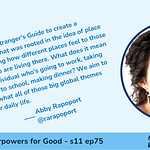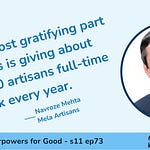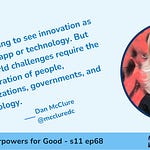Devin: What is your superpower?
Arthur: I would say my superpower is having relentless focus and not really believing that any job is too small.
Embracing Diversity Can Be a Competitive Advantage
Arthur Woods, co-founder of Mathison and author of Hiring for Diversity, says, “The great news in our space is that the last ten years, 15 years, if anything, has led us to many more conclusions about the fact that there's a strong ROI for diversity.”
He lists the key points:
Businesses that are representative outperform others in terms of business performance and revenue.
They're more likely to retain their team members.
Organizations that are more diverse are more likely to innovate.
Arthur goes on to say that organizations that fully embrace diversity don’t just improve their performance, they make an inclusive culture into a competitive advantage.
That level of adoption requires deliberate work. Arthur notes that more than three-quarters of companies don’t set diversity goals. “We can’t manage what we can’t measure,” he adds.
So, the first thing to do is to start measuring.
Once a company reaches the conclusion that it has a diversity issue, the next step is to identify measurable tactics to address it. “Every quarter, let's set a couple of intentions for what we will improve,” Arthur suggests.
Those changes could include things as simple yet important as building a more equitable interview process, changing the way the company sources candidates or improving training to address unconscious bias in job descriptions.
Job Descriptions and Interviews
Arthur highlights two areas for focus: job descriptions and candidate interviews.
“We should be really intentional about how we actually define our job requirements,” he says. “An underrepresented job seeker might not have been afforded the same opportunities as the next person, but could have all the right skills and experiences to be successful in the job.”
Eliminating what Arthur calls “exorbitant requirements” and recognizing that many skills and experiences are transferrable, allows hiring managers to consider a more diverse set of candidates who have the same potential to succeed in the role.
Interviews represent the second area of Arthur’s focus:
A lot of leaders that have interviewed people for years and years and years; they have their system in their mind that has worked well for them. They make up their interviews as they go. They walk into an interview not even remembering maybe sometimes the role they're interviewing for, asking job seekers questions on the fly, and that experience can be very inconsistent and inequitable.
Instead, Arthur suggests preparing for the interview in advance and having a consistent way of assessing the answers you hear. Having a deliberate process for evaluating interview answers is a vital step toward eliminating unconscious bias.
Unconscious or Implicit Bias
“The first thing to note is that we are all guilty of bias,” Arthur says. “It's pervasive in every decision we make.”
Once we acknowledge that, we can more readily address the judgments and decisions we make to ensure they align with our stated intentions to eliminate them.
Arthur shared an example:
I heard an interviewer the other day who said a person was late to a job interview. Right. And they already docked the person points. Later on, they found out that the person had gotten in a car accident on the way to the job interview. Right. And already, again, they were starting to say this person is flaky, they're late, and they didn't hear the full story. And later on, they did, And it made a ton of sense.
By formalizing and preparing for job interviews, managers can make better, less biased decisions, resulting in both better and more diverse teams.
Universal Adoption
Arthur looks at HelloFresh as a positive case study. The popular meal kit company has been a long-term client of Mathison. Over the years, it has sometimes doubled or tripled in size annually.
“They came in and said, look, we want to build a [diversity] strategy from the ground up,” Arthur says.
They used Mathison’s equity index to build their strategic framework. To cast an even wider net, they looked at new dimensions of diversity. (That work helped Arthur define twelve different dimensions of diversity in his book.) That step alone helped dramatically expand the sourcing pipeline for new candidates.
Then, HelloFresh implemented training. The training included everyone, from the bottom of the organization to the top. It wasn’t just training for frontline employees. By including people at the top of the organization in the training, they modeled from the top what the implementation of better inclusion practices would be.
Arthur describes the results as “transformational,” adding, “the organization has a lot to show for it years later.”
Another client, Horizon Media, used a similar approach. He says, “They made this bold statement and they said, we have to basically tell our people that this work is not just the talent team. It's not just the diversity leadership. It's everyone.”
Arthur notes that the impact on rank and file employees is significant. Speaking in their place, he says, “Not only am I aware that this is going on, but I feel part of it. I feel personally responsible for it.”
When everyone feels like part of the process of building an inclusive culture, it is more readily achieved—along with all the benefits that result.
As a social entrepreneur, Arthur recognizes that he’s been aided by his superpower, being willing to do the hard stuff.






















'There's a Strong ROI for Diversity,' Expert Says